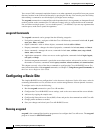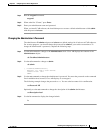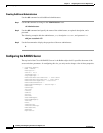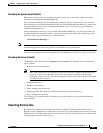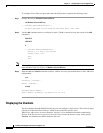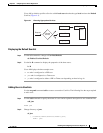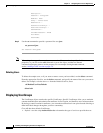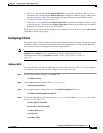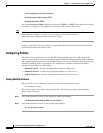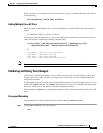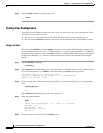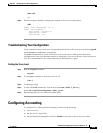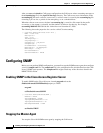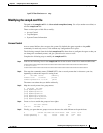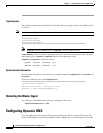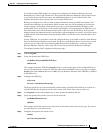
4-10
Installing and Configuring Cisco Access Registrar, 4.2
OL-17221-02
Chapter 4 Configuring Cisco Access Registrar 4.2
Configuring a Basic Site
set IncomingScript ParseServiceHints
EnableDynamicAuthorization TRUE
EnableNotifications TRUE
The script, ParseServiceHints, checks the username for %PPP or %SLIP. It uses these tags to modify
the request so it appears to the RADIUS server that the NAS requested that service.
Note When you are using a different NAS than the one in the example, or when you are adding
NAS proprietary attributes, see the Cisco Access Registrar User Guide for more
information about configuring Client and Vendor objects.
Configure your NAS, using your vendor’s documentation. Make sure both your NAS and the Client
specification have the same shared secret.
Configuring Profiles
The Profiles object allows you to set specific RFC-defined attributes that Cisco AR returns in the
Access-Accept response. You can use profiles to group attributes that belong together, such as attributes
that are appropriate for a particular class of PPP or Telnet user. You can reference profiles by name from
either the UserGroup or the user properties. The sample users, mentioned earlier in this chapter,
reference the following Cisco AR profiles:
• default-PPP-users—specifies the appropriate attributes for PPP service
• default-SLIP-users—specifies the appropriate attributes for SLIP service
• default-Telnet-users—specifies the appropriate attributes for Telnet service.
Setting RADIUS Attributes
When you want to set an attribute to a profile, use the following command syntax:
set <attribute> <value>
This syntax assigns a new value to the named attribute. The following example sets the attribute
Service-Type to Framed:
Step 1 Use the cd command to change to the appropriate profile and attribute.
cd /Radius/Profiles/Default-PPP-users/Attributes
Step 2 Use the set command to assign a value to the named attribute.
set Service-Type Framed



